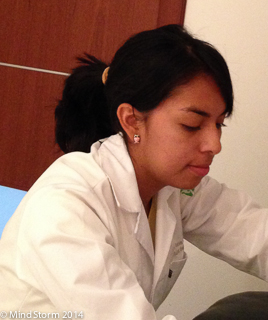
It is sometimes frustrating when I speak “perfect Spanish” and the other person looks at me like I’ve grown an extra head. I know I said it right… didn’t I?
Well, today I had a little lesson on what it probably sounds like to the native speaker I am trying to communicate with.
During parts of my regular physical therapy sessions, I am left alone while there is a heating pad and electro-shock electrodes doing their thing to my ankle. I often listen to my Pimsleur Spanish lessons while lying there. Since the walls don’t go all the way to the ceiling, they can hear me mumbling Spanish (or not, when stuck).
The therapist assistant speaks almost no English at all, and is amused that I am working so hard to learn Spanish. After all, it seems like such an easy language to her? I asked if she had English in school, and yes, several years but she didn’t do very well at it. Somehow the irony of those two statements didn’t sink in. Ahhh, to be so young and naive again. ☺
She then started giving me vocabulary words from her very limited memory of English, to see if I knew the Spanish. I did pretty good for awhile:
- “city” — “ciudad”
- “morning” — “manana”
- “night” — “noche”
- … and on like this for maybe 5 minutes …
- “frient” — huh??
I sat up (while she was still massaging my foot) and asked “frient?” She replied, “si, frient!” After saying that, and my having no idea what she meant, she pointed to me and then herself and repeated “frient!”
Ohhhh… “Friend” I declared. “d,” no “t”. “Si, frient!” ☺
I never did get a proper “friend”, but I gave the expected reply of “amigo” once I knew what was intended.
Funny how one little letter mispronounced can make a word nearly impossible to understand. Now I think I have a better idea of why my “perfect Spanish” is so often met with befuddled stares…